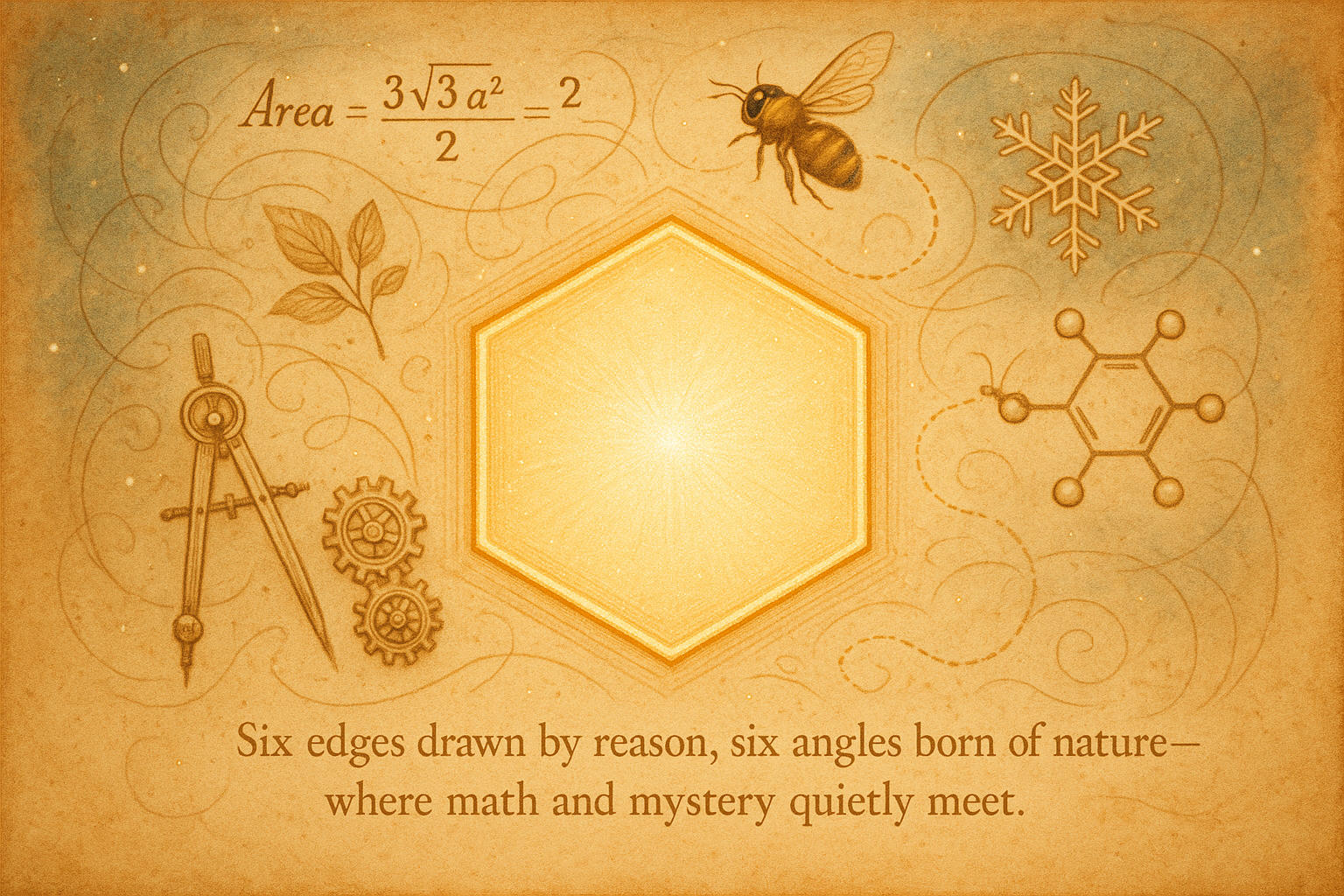Working with a six-sided shape and not sure how to find its area? You’re not alone. Whether you’re handling a geometry problem, sketching out a floor plan, or just curious about shapes, the Hexagon Area Calculator makes things quick and hassle-free. In this guide, you’ll learn how the calculator works, the formula behind it, and some unexpected places where hexagons show up in the real world.
Want to learn more about other shapes? Try our full collection of Area Calculators.
What Is a Hexagon?
A hexagon is a six-sided polygon with six angles. While that definition sounds simple, hexagons actually come in several forms.
The most familiar is the regular hexagon, where all sides and angles are identical. This version is perfectly symmetrical and commonly found in nature, art, and engineering. There are also irregular hexagons, which feature sides or angles that differ—less uniform, but still mathematically correct.
What sets hexagons apart is how efficient their shape is. In a regular hexagon, each interior angle measures 120 degrees, and the shape fits together seamlessly with others of its kind to cover a surface—just like squares or equilateral triangles. This tiling ability makes hexagons extremely practical in the real world, from honeycomb structures to tiled floors.
When it comes to finding the area of a hexagon, its symmetry actually simplifies the process—provided you’re using the correct formula or, even better, a calculator designed for it.
That’s where the Hexagon Area Calculator becomes handy. Just input the side length, and the tool delivers the result instantly, saving you time and effort.
How to Calculate Hexagon Area
You don’t need to be a math whiz to calculate hexagon area—you just need the right formula and a basic understanding of the terms. For a regular hexagon, the formula to find the area is:
Area = (3 × √3 × a²) ÷ 2
Here’s what each part means:
-
a is the length of one side of the hexagon
-
a² means you multiply the side length by itself (that’s the “squared” part)
-
√3 ≈ 1.732, a constant derived from the geometry of equilateral triangles
-
Multiply all together, then divide by 2
Example Calculation:
Let’s say the side of your regular hexagon is 6 inches:
-
Square the side:
6 × 6 = 36 -
Multiply by 3:
3 × 36 = 108 -
Multiply by √3:
108 × 1.732 ≈ 187.1 -
Divide by 2:
187.1 ÷ 2 = 93.55 square inches
So the area is approximately 93.55 in²
Of course, you can skip the math and use the Hexagon Area Calculator to instantly get your result—just enter the side length and let the tool do the rest.
Hexagon in Nature
Let’s take a moment to step away from geometry and enter the world of nature—more specifically, the inside of a beehive.
When you look into a honeycomb, you’re not seeing a random pattern. You’re witnessing a marvel of natural design: countless hexagons packed together with precision. But why choose hexagons? Why not circles or squares?
As it turns out, bees seem to instinctively know something that took mathematicians hundreds of years to prove: hexagons are the most space-efficient shape.
Here’s what makes them so effective:
-
Zero wasted space: Unlike circles, hexagons connect seamlessly without leaving gaps.
-
Maximum efficiency: Bees can store the most honey using the least amount of wax when they build with hexagons.
-
Strong design: The six-sided pattern spreads weight evenly, making the structure stable and long-lasting.
This isn’t just nature being clever—it’s backed by math. In 1999, mathematician Thomas Hales formally proved the Honeycomb Conjecture, a centuries-old theory stating that a hexagonal tiling is the most efficient way to divide a flat surface into equal parts with minimal perimeter.
So while we turn to the Hexagon Area Calculator for quick answers in math class or design planning, bees have been solving the same problem for millions of years—no formulas, no tech. Just instinct, evolution, and a deep connection to one of nature’s most brilliant designs.
Kind of amazing, isn’t it?
Try out Octagon Area Calculator
Hexagon Facts
At first glance, the hexagon might seem like just another geometric figure—but look a little closer, and you’ll see it appearing in fascinating places across science, design, and even language. Here are a few fun facts that highlight just how adaptable and important this six-sided shape really is:
1. Chemistry’s Favorite Shape
From benzene to graphene, some of the most essential molecular structures in chemistry are built on hexagons. Benzene molecules consist of six carbon atoms forming a ring, laying the groundwork for countless organic substances. And graphene—often called a “miracle material”—is a single layer of carbon atoms arranged in a flawless hexagonal grid. It’s incredibly strong, ultra-light, and conducts electricity better than copper.
2. Snowflakes Are Hexagons
Each snowflake drifting from the sky is a tiny masterpiece of geometry. Because of the way water molecules align when freezing, snowflakes naturally develop six-sided symmetry. That’s why they consistently take on detailed hexagonal forms—it’s nature's frozen signature.
3. Hexagons in the Toolbox
Check your toolkit, and you’re likely to spot some hex-shaped hardware. Hex bolts, hex nuts, and hex keys (better known as Allen wrenches) are all designed with six sides. This shape provides a secure grip and smooth rotation, making it ideal for mechanical and engineering tasks.
4. A Greek Name with Meaning
The word “hex” comes from the Greek root héx, meaning six. So when you say “hexagon,” you’re literally referring to a shape with six angles. It’s a tidy linguistic connection that links language to geometry in a meaningful way.

Check out Math section to solve math quickly and easily

